-
Table of Contents

“Unraveling Bonds: The Hidden Strain of Addiction on Relationships”
Introduction
Addiction is a pervasive issue that extends far beyond the individual suffering from substance abuse or behavioral dependencies. It infiltrates the very fabric of personal relationships, often causing significant emotional, psychological, and social turmoil. Understanding the impact of addiction on relationships is crucial for comprehending the full scope of its consequences. This exploration delves into how addiction can erode trust, communication, and intimacy between partners, strain familial bonds, and disrupt social networks. By examining these dynamics, we can better appreciate the complex interplay between addiction and relational health, and underscore the importance of comprehensive support systems for both the addicted individual and their loved ones.
The Emotional Toll of Addiction on Family Dynamics
Addiction is a pervasive issue that affects not only the individual struggling with substance abuse but also the family members who love and support them. The emotional toll of addiction on family dynamics can be profound, often leading to a cascade of challenges that test the resilience and unity of the family unit. Understanding these impacts is crucial for fostering empathy, support, and ultimately, healing.
At the heart of the emotional turmoil lies the unpredictability that addiction brings into the household. Family members often find themselves on an emotional rollercoaster, grappling with feelings of fear, anger, and helplessness. The erratic behavior of a loved one battling addiction can create an environment of constant anxiety, where the next crisis seems perpetually around the corner. This heightened state of alertness can erode the sense of safety and stability that families typically rely on, leading to chronic stress and emotional exhaustion.
Moreover, addiction can significantly strain communication within the family. The person struggling with addiction may become secretive, defensive, or even deceitful, creating barriers to open and honest dialogue. This breakdown in communication can foster misunderstandings and resentment, further isolating the individual and exacerbating the problem. Family members may also struggle with their own feelings of guilt and shame, questioning whether they could have done something differently to prevent the addiction. These internal conflicts can make it difficult to reach out for help or to support one another effectively.
In addition to communication challenges, addiction often disrupts the roles and responsibilities within the family. For instance, a parent battling addiction may become less reliable, forcing children to take on more adult responsibilities prematurely. This role reversal can rob children of their childhood and place undue pressure on them, affecting their emotional and psychological development. Similarly, spouses or partners may find themselves juggling multiple roles, from caregiver to financial provider, which can lead to burnout and resentment.
Despite these challenges, it is important to recognize that families also possess incredible strength and resilience. Many families find that facing addiction together can ultimately bring them closer, fostering a deeper understanding and appreciation for one another. The journey through addiction and recovery can be an opportunity for growth, where family members learn to communicate more effectively, set healthy boundaries, and support each other in meaningful ways.
One of the most powerful tools in navigating the emotional toll of addiction is seeking professional help. Therapists and counselors can provide a safe space for family members to express their feelings, work through conflicts, and develop coping strategies. Support groups, such as Al-Anon or Nar-Anon, offer a community of individuals who understand the unique challenges of loving someone with an addiction. These resources can be invaluable in helping families rebuild trust, improve communication, and find hope amidst the chaos.
Ultimately, while the emotional toll of addiction on family dynamics is undeniable, it is not insurmountable. By acknowledging the impact of addiction, seeking support, and fostering open communication, families can navigate this difficult journey together. The path to recovery is rarely straightforward, but with perseverance, compassion, and a commitment to healing, families can emerge stronger and more united than ever before.
Rebuilding Trust After Addiction: Steps for Healing Relationships
Rebuilding trust after addiction is a journey that requires patience, commitment, and a deep understanding of the complexities involved. Addiction, by its very nature, often leads to broken promises, deceit, and emotional pain, which can severely damage relationships. However, the path to healing is not only possible but can also lead to stronger, more resilient bonds. The first step in this process is acknowledging the hurt and the impact that addiction has had on the relationship. This acknowledgment is crucial because it validates the feelings of those who have been affected and sets the stage for genuine healing.
Following acknowledgment, open and honest communication becomes the cornerstone of rebuilding trust. It is essential for both parties to express their feelings, fears, and expectations without judgment. This dialogue should be ongoing and evolve as the relationship progresses. For the person in recovery, it is important to be transparent about their journey, including the challenges they face and the steps they are taking to maintain sobriety. This transparency helps to rebuild trust by demonstrating a commitment to change and accountability.
In addition to communication, setting realistic expectations is vital. Rebuilding trust is not an overnight process; it requires time and consistent effort. Both parties need to understand that setbacks may occur, and these should be viewed as opportunities for growth rather than failures. Establishing small, achievable goals can help to create a sense of progress and reinforce the commitment to healing. For example, attending therapy sessions together or participating in support groups can provide a structured environment for addressing issues and fostering mutual understanding.
Another critical aspect of rebuilding trust is forgiveness. This does not mean forgetting the past or excusing harmful behavior, but rather letting go of resentment and anger that can hinder the healing process. Forgiveness is a personal journey and may take time, but it is essential for moving forward. It allows both parties to release the emotional burden of the past and focus on building a healthier future together.
Moreover, rebuilding trust often involves creating new, positive experiences that can replace the negative memories associated with addiction. Engaging in activities that both parties enjoy, setting aside quality time for each other, and celebrating milestones in recovery can help to strengthen the bond and create a new foundation for the relationship. These shared experiences can serve as reminders of the progress made and the potential for a brighter future.
It is also important to seek professional help when needed. Therapists and counselors who specialize in addiction and relationships can provide valuable insights and strategies for navigating the complexities of rebuilding trust. They can offer a neutral perspective and help to mediate difficult conversations, ensuring that both parties feel heard and understood.
Ultimately, rebuilding trust after addiction is a testament to the resilience and strength of the human spirit. It requires a willingness to confront painful truths, a commitment to change, and a belief in the possibility of redemption. While the journey may be challenging, the rewards of a renewed and strengthened relationship are immeasurable. By taking deliberate steps towards healing, individuals can transform their relationships and create a foundation of trust that is even stronger than before. This process not only heals the wounds of the past but also paves the way for a future filled with hope, understanding, and unwavering support.
Q&A
1. **Question:** How does addiction affect communication within relationships?
**Answer:** Addiction often leads to breakdowns in communication, as individuals may become secretive, dishonest, or emotionally unavailable, causing misunderstandings and mistrust between partners.
2. **Question:** What are some common emotional impacts of addiction on family members?
**Answer:** Family members may experience a range of emotions including anger, frustration, sadness, anxiety, and feelings of betrayal, which can lead to emotional distance and strained relationships.
Conclusion
Understanding the impact of addiction on relationships reveals the profound and multifaceted challenges that individuals and their loved ones face. Addiction can erode trust, communication, and emotional intimacy, often leading to conflict, isolation, and breakdowns in relationships. It can impose significant emotional, financial, and psychological burdens on partners, family members, and friends. Recognizing these effects is crucial for developing effective support systems and interventions that address both the addiction and its relational consequences, fostering healing and resilience for all involved.



